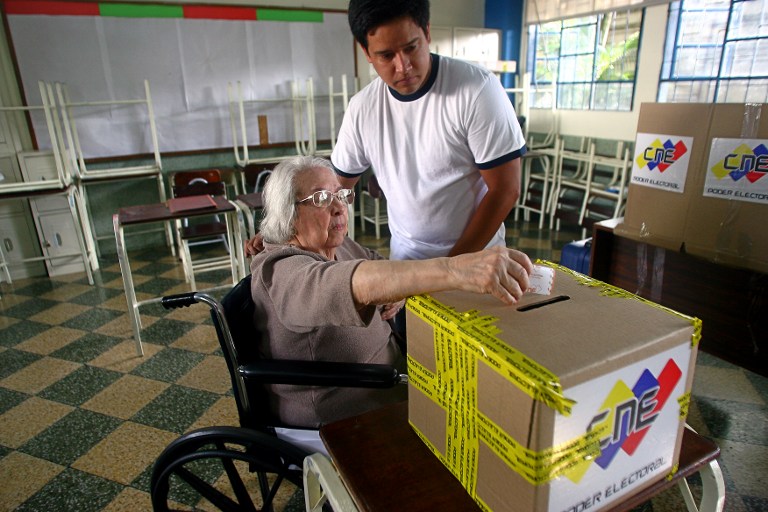SUMMARY
This is AI generated summarization, which may have errors. For context, always refer to the full article.

CARACAS, Venezuela (UPDATED) – Venezuelans voted Sunday, October 7 (Monday, October 8 in Manila) with President Hugo Chavez’s 14-year socialist revolution on the line as the leftist leader faced youthful rival Henrique Capriles in his toughest electoral challenge yet.
Sitting on the world’s biggest proven crude oil deposits, Chavez has used petro-dollars to build a network of regional allies and secure the loyalty of poor Venezuelans dependent on the generosity of his social programs.
Key Communist ally Cuba and other Latin American partners are watching closely to see if 40-year-old Capriles, at the head of a united opposition, can pull off a stunning upset and defeat the anti-American firebrand.
Voters stood in huge lines to cast their ballots after Chavez supporters played military-style bugles before dawn to roust loyalists of the president, who is seeking a new six-year term to cement his elected “revolution.”
Some polling stations remained open more than one hour after the official closing hour, 6:00 pm (2230 GMT), due to the lines, the National Electoral Council said. Around 19 million people were registered to vote.
Capriles has surged in opinion polls, attracting huge rallies with his promises to curb runaway crime and unite the deeply divided South American country.
Chavez, who won 62 percent of the vote in the 2006 election, held a 10-point lead in the latest opinion poll, but other surveys have put the rivals in a statistical dead heat.
Weakened by a bout with cancer, the 58-year-old president stepped up his campaign this week, even dancing in the rain at a Caracas rally on Thursday as he warned that Capriles would bury his popular social “missions.”
The vocal US critic voted in the 23 de Enero (January 23) slum, a bastion of support, where he vowed to accept the results, “whatever they may be.”
“Whether the difference is one vote or three million votes, the responsible political actors must recognize the results, especially in this completely transparent electoral system,” he told reporters.
Capriles made the same pledge as he voted in the upper-class neighborhood of Mercedes, where supporters chanted: “You see it, you feel it: President Capriles!”
“I will respect the will of the people today,” the former state governor told reporters. “What the people say today is sacred to me.”
From the capital’s hillside slums to its wealthier neighborhoods, many Venezuelans arrived at polling stations hours before they opened, heeding the candidates’ call for people to vote early.
In the 23 de Enero slum, troops ensured security as people stood in line to vote in a school.
“He can’t lose today, after all he’s done,” said Yurbi Castro, 38, an agronomy expert decked out in a red shirt, the color of Chavez loyalists.
In the middle-class Chacao district, a Capriles bastion, hundreds of people waited to vote as a vendor sold coffee and empanadas.
“I want change, I want peace, I want to be able to calmly walk down the street,” said Miguel Villarroel, 32, a hotel administrator who voted for Capriles and blamed Chavez for the rising murder rate.
Maria Rodriguez, 37, a watch store owner, and her friend Jenny Diaz, 36, a publicist, had been waiting to vote since 3:30 am. The two women worried that Chavez and his supporters would not accept defeat.
If Chavez loses, “the criminals will go out on the street to scare people,” Diaz said. “(Chavez) won’t accept defeat easily.”
Election experts say the electronic voting system is reliable and both candidates have signed a pledge to accept the result. But suspicions run high that whoever loses will not concede defeat.
The campaign was marred last weekend by a shooting that left three Capriles supporters dead during a campaign event in western Venezuela.
Chavez is a highly polarizing figure who survived a coup in 2002 and became popular with the long-neglected poor for using the country’s vast oil wealth to fund health and education programs.
Mentored by Cuba’s Fidel Castro, he has become the leading voice of Latin America’s left, railing against the US “empire” while befriending Iran and Syria.
Capriles, who describes himself as David fighting Goliath, won an unprecedented primary election in February. Fragmented during Chavez’s rule, the opposition united for once behind his candidacy.
“Today we are millions of Davids! God will guide our way,” Capriles tweeted on election day.
Nicknamed “Skinny,” Chavez’s young rival, an avid runner, campaigned in around 300 towns, wearing a baseball cap in Venezuela’s yellow, blue and red as he vowed to unite the country, accusing Chavez of being “sick with power.”
The opposition accused Chavez of misusing public funds for his campaign and dominating the airwaves while forcing government workers to attend rallies through intimidation.
Capriles has hammered Chavez over the country’s regular power outages, food shortages and runaway murder rate, which has risen to 50 homicides per 100,000 inhabitants.
Though a business-friendly candidate, Capriles wooed Chavez’s base by presenting himself as a center-left politician who would continue social “missions” that deliver free health care and subsidized food to the poor.
Chavez has rankled the private sector by nationalizing a slew of companies in the oil, electricity and bank sectors as part of his self-styled 21st century socialism.
Capriles has pledged to invite more private investment to the state-run PDVSA oil company and depoliticize the firm.
Some 140,000 troops were deployed to prevent violence while borders were closed and alcohol sales were banned until Monday. – Laurent Thomet, Agence France-Presse
Add a comment
How does this make you feel?
There are no comments yet. Add your comment to start the conversation.